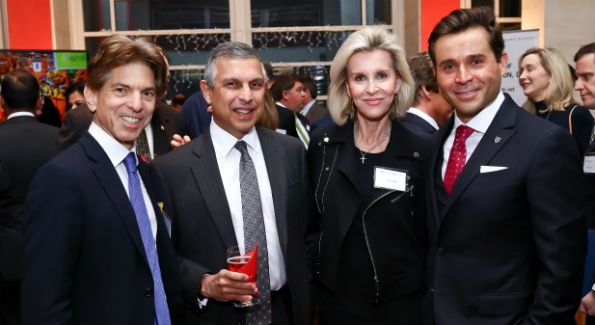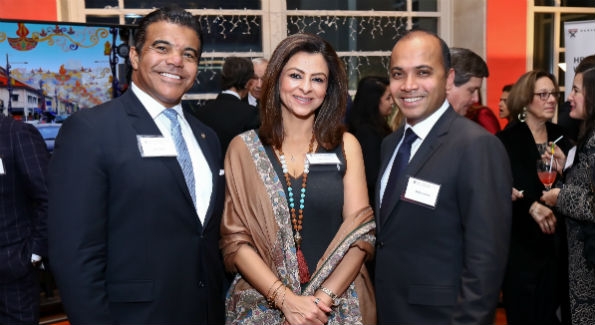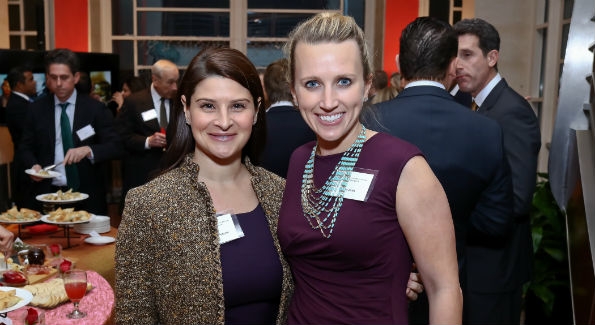The Harvard Business School Club of Washington kicked off the new year at the Embassy of Singapore.

Robert Haft, Amb. Ashok Mirpuri, Mary Haft and Antonio Alves (photo by Tony Powell)
With the inauguration of a new U.S. President fresh on their minds, members of the Harvard Business School Club of Washington, D.C. kicked off the new year with an exclusive reception and seated dinner at the Embassy of Singapore last week, with its dynamic Ambassador Ashok Mirpuri playing host to the “Chairman’s Circle Salon” which included a VIP group of HBS alums and friends.
Ambassador Mirpuri, a career diplomat who participated in Harvard Business School’s Advanced Management Program, welcomed the VIP guests with a reception featuring open bar and his country’s signature drink, “The Singapore Sling,” and heaping platters of Asian pot stickers, cheese and charcuterie. Afterwards, guests settled into a candlelight buffet dinner of Singapore delicacies, and an enlightening conversation with Mirpuri on Singapore’s robust economy and role in the world, led by HBS of DC Chairman Antonio Alves.
Ambassador Mirpuri shared his thoughts on Sinagpore’s model of economic prosperity and sound governance, and the country’s key role in addressing regional challenges.
“Singapore’s success relies very much on the success of Southeast Asia and the rest of the region,” Mirpuri said. “Our prosperity fits into a role of a wider, stronger, more sophisticated Southeast Asia, and of working very much with the great powers, such as the United States.”
Like most nations, Singapore is very much dependent on free trade and the expansion of economic engagement in the Asia Pacific, with its strong participation in the ASEAN Economic Community and through the Regional Comprehensive Economic Partnership, which involves ASEAN and six other countries including China, India, Japan, Korea, Australia, and New Zealand. Amb. Mirpuri added his country’s participation in the Trans-Pacific Partnership [TPP], which he called “a very forward-looking agreement” and “a critical part of our economic architecture.”

Jerry Pierce, Saima Ahmed, Mahfuz Ahmed (photo by Tony Powell)
“Together, all of these parts will come together into something that we call the free trade area of the Asia Pacific,” he added.
Asked if newly-inaugurated President Donald J. Trump‘s Executive Order uncoupling the United States from the TPP might be disruptive to Singapore and to the region, Ambassador Mirpuri responded: “The idea of free trade has been very important in how Singapore and the rest of the region look at the U.S. role…But while we see this as a way to benefit all the countries in the region, some countries like the United States may not be up to joining the TPP at this time,. However, we look forward to engaging the U.S. in other ways to create bridges that connect the RCEP, the TPP, and APEC in a different form.”
Mirpuri, Singapore’s Ambassador to the United States since 2012, is a seasoned diplomat. He previously served as Ambassador to Indonesia, High Commissioner to Malaysia and prior to that, High Commissioner to Australia. An honors graduate of the National University of Singapore, he received his Master’s degree from the University of London’s School of Oriental & African Studies under a Raffles Scholarship and attended the Programme for Executive Development at the Institute for Management Development in Switzerland, followed by the executive program at HBS.
He brings much of his executive education to bear in describing Singapore’s emergence as a highly developed market economy and one of the world’s leading hubs for global commerce, finance and transport. Along with Hong Kong, South Korea and Taiwan, Singapore is is one of the original Four Asian Tigers, with Singapore’s economy known as one of the world’s freest, most competitive, most dynamic and most business-friendly, not to mention its ranking as one of the least corrupt nations in the world. The Singaporean military is arguably the most technologically advanced in Southeast Asia (one in every four dollars of government spending spent on defense).

Christina Perrone and Abby Jones (photo by Tony Powell)
That said, Mirpuri says his country is dedicated to lifting up some of its less affluent neighbors in Southeast Asia by providing “a whole buffet of courses” in technical cooperation and training. “We strongly feel that we should provide senior civil servants from around the region an opportunity to move forward on their own development objectives and see how it really works on the ground,” he said. “Our technical cooperation programs for countries to choose and decide to participate in range from airport management and port management to trade liberalization issues and financial regulation.”
Mirpuri said he visits Silicon Valley frequently and has studied a model for innovation that clearly desires and rewards risk. “Having visited startups there and in other parts of the U.S. what I find is a very strong sense of sharing ideas,” he said. “Many of these U.S. startups want to go look at Asia, and maybe test out some of their best ideas in Singapore. This is why now we are looking towards something called a ‘smart nation,’ which uses big data analytics in areas like transport systems and health care.”
Notable attendees of the Chairman’s Salon included former Navy Secretary John Dalton, Wentworth Group CEO Earl Stafford, Maccu Piscu CEO Melanie Asher, LegalSifter CEO Kevin Miller, HBS alum and health care entrepreneur Robert Haft, PEN/Faulkner vice president Mary Haft, Singapore Deputy Chief of Mission Sheryl Shum and Washington philanthropist Annie Totah, founder and CEO of AST Partnership for Brighter Tomorrows.




